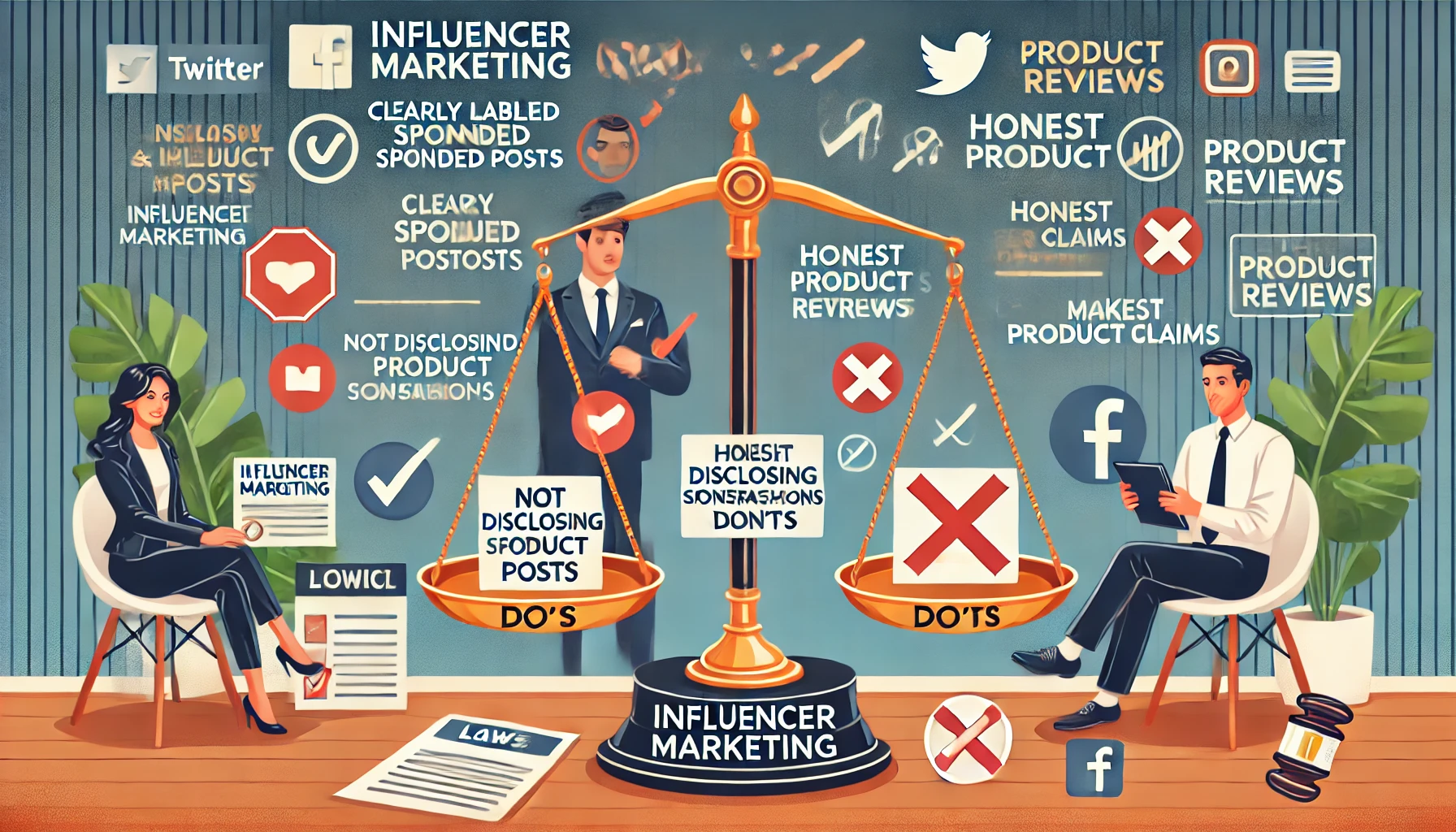
Influencer Marketing: Legal Do's and Don'ts
The world of influencer marketing is a vibrant space, buzzing with collaborations between brands and social media personalities. But amidst the excitement, a common worry pops up: the FTC and its regulations. Fear not, fellow marketers! While the FTC does have guidelines for influencer marketing, navigating them doesn't have to be a head-scratching ordeal. Let's shed some light on the FTC and how you can ensure your influencer marketing campaigns are not only successful but also compliant.
Why the FTC Matters for Influencer Marketing:
The Federal Trade Commission (FTC) is the watchdog agency in the US that protects consumers from deceptive advertising practices. This includes ensuring transparency in influencer marketing, where a brand might pay someone to promote their product without explicitly stating it. The FTC wants to make sure consumers aren't misled and can make informed decisions.
The Confusion Around FTC Regulations:
So, what exactly does the FTC require? Here's where some confusion arises. The FTC doesn't have a specific set of "rules" for influencer marketing. Instead, it relies on existing guidelines for endorsements and advertising. This can feel a bit broad, but it essentially boils down to one key principle: transparency.
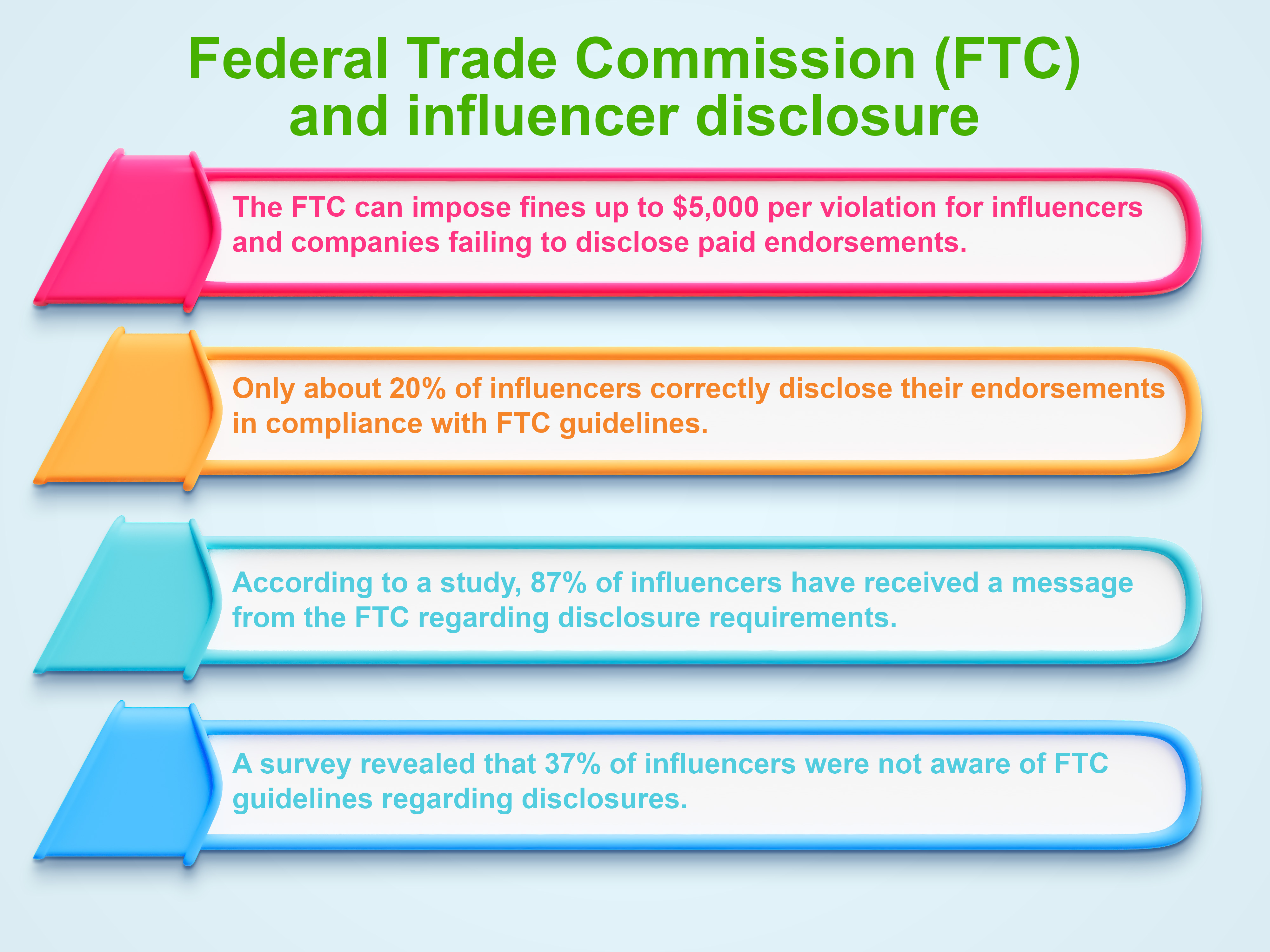
The Transparency Trap: Avoiding Misleading Collaborations
The main concern for the FTC is that consumers shouldn't be fooled into thinking an influencer's recommendation is purely organic when it's actually paid for or sponsored. Here's how to ensure your influencer partnerships are transparent and FTC-friendly:
Disclosures, Disclosures, Disclosures: This is the golden rule. Influencers must clearly and conspicuously disclose any material connection they have with your brand. This means using terms like "ad," "sponsored," "paid partnership," or "ambassador" in a way that's easy to understand and can't be missed.
Don't Hide the Disclosure: Burying the disclosure in a sea of hashtags or placing it in a caption's fine print is a big no-no. The disclosure should be placed prominently within the post, either at the beginning or clearly visible without requiring viewers to click "see more."
Be Specific About the Relationship: Vague terms like "collaboration" or "partner" don't cut it. The disclosure should be clear about the nature of the relationship. Did you pay the influencer? Provide them with free products? Be upfront about it.
Language Matters: The disclosure should be in the same language as the rest of the post. Don't expect your international audience to decipher a disclosure in English buried in a caption written in another language.
Beyond Disclosures: Building Trustworthy Partnerships
While disclosures are crucial, transparency goes beyond just ticking a box. Here are some additional tips for building trust with consumers and the FTC:
Partner with Authentic Voices: Choose influencers who genuinely align with your brand values and whose audience trusts their recommendations. Forced endorsements are a recipe for disaster.
Focus on Value, Not Just Sales: Successful influencer marketing campaigns go beyond just pushing products. Partner with influencers who can create engaging content that provides value to their audience, showcasing how your product fits into their lives.
Give Influencers Creative Freedom: Micromanaging content stifles creativity and authenticity. Provide influencers with clear guidelines and brand messaging, but trust them to create content that resonates with their audience.

The FTC: A Partner, Not an Enemy
Understanding FTC guidelines doesn't have to be a daunting task. Consider the FTC as a partner in building trust and transparency in the influencer marketing space. By following these principles, you can create successful influencer campaigns that not only engage your target audience but also stay on the right side of the FTC.

Bonus: Avoiding Common Pitfalls
Here are some additional pitfalls to avoid in your influencer marketing endeavors:
Fake Followers: Partnering with influencers who have inflated follower counts through fake followers is not only ineffective but also potentially misleading to consumers. Focus on influencers with genuine engagement and a loyal audience.
Check this:
The average cost to buy 1,000 fake followers ranges from $5 to $16.
According to a survey, 67% of brands have encountered influencers with fake followers.
Up to 49% of influencers have experienced fraud, primarily from fake followers.
A report highlighted that 38% of Instagram influencers have bought fake followers.
On Twitter, 22% of the followers of some top celebrities are fake.
50% of the accounts following popular influencers like Kim Kardashian are suspected to be fake.
A study found that 30% of social media influencers have inflated their follower count using fake followers.
Bait-and-Switch Tactics: Don't mislead consumers with deceptive claims or unrealistic product portrayals in influencer content. Be honest about your product and its benefits.
The FTC has imposed fines totaling over $100 million on companies for engaging in bait-and-switch advertising.
65% of consumers reported abandoning a purchase when they realized a bait-and-switch tactic was used.
About 12% of online shoppers have fallen victim to bait-and-switch schemes at least once.
Around 90% of consumers expect transparency and honesty from retailers, with bait-and-switch tactics severely damaging that expectation.
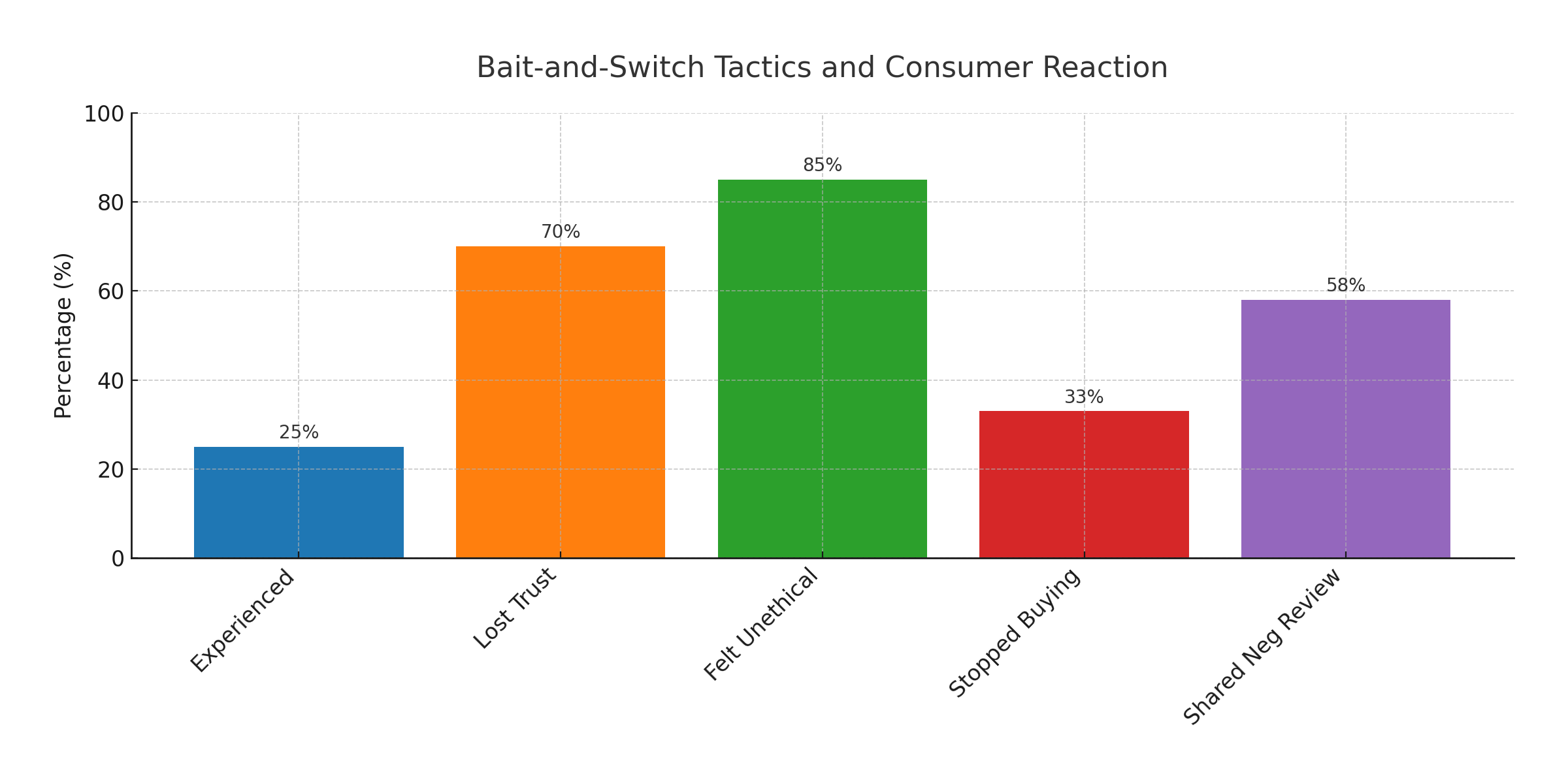
Ignoring Negative Reviews: Don't shy away from negative reviews in influencer content. Authentic conversations, even with some criticism, build trust and showcase your brand's commitment to transparency.
Nearly 45% of consumers say they are more likely to visit a business that responds to negative reviews.
95% of unhappy customers will return if an issue is resolved quickly and efficiently, underscoring the importance of addressing negative reviews.
68% of consumers trust reviews more when they see both positive and negative reviews, along with responses from the business.
Customers who receive a response to their negative reviews are four times more likely to return and make future purchases.
Ignoring negative reviews can lead to a 21% decrease in customer advocacy, meaning fewer customers are willing to recommend the business to others.
The Power of "Yes, And": Collaborating with Influencers for FTC-Compliant Success
Now that we've addressed the FTC's role and established transparency as the cornerstone of compliant influencer marketing, let's explore how to leverage this knowledge to build successful and FTC-friendly collaborations.
Moving Beyond Disclosures: Building "Win-Win-Win" Partnerships
Disclosures are essential, but they're just the first step. Here's how to create influencer partnerships that benefit your brand, the influencer, and ultimately, the consumer:
Align Your Values: Don't just chase follower counts. Find influencers whose values and target audience resonate with your brand. This organic fit leads to more believable endorsements and higher engagement. Imagine a health food company partnering with a fitness influencer passionate about healthy living - a perfect match!
Embrace Co-Creation: Instead of dictating every aspect of the content, work collaboratively with the influencer. Tap into their creativity and expertise to develop content that feels authentic and aligns with their audience's preferences.
Focus on Long-Term Relationships: Think beyond one-off campaigns. Building long-term partnerships with the right influencers fosters trust and allows them to become true advocates for your brand.

Empowering Influencers for Transparency:
Transparency is a two-way street. Here's how you can empower your influencer partners to be FTC-compliant:
Provide Clear Guidelines: Develop a brand disclosure policy outlining your expectations for influencer partnerships. This policy should be clear, concise, and easily accessible to influencers you work with.
Offer Disclosure Templates: Make things easier for influencers by providing pre-written disclosure templates they can adapt for their content. This ensures consistent messaging and reduces the risk of missed disclosures.
Open Communication is Key: Maintain open communication with your influencer partners. Address any questions or concerns they might have regarding FTC regulations and encourage them to disclose any material connections with your brand.
Some interesting facts about the Influencers and Social Media Market
- 60% of Instagram users say they discover new products on the platform (Instagram Business).
- 89% of marketers use influencer marketing plans to increase their budget or maintain their investments (Mediakix).
- 17% of companies spend over half of their marketing budget on influencers (Bigcommerce).
- 91% of millennials trust online reviews as much as friends and family (Crowdtap).
- 67% of marketers use Instagram for influencer marketing (Influencer Marketing Hub).
- 54% of female consumers purchased a product after seeing it recommended by an influencer (Activate).
- 80% of social media marketers report that influencer content performs the same or better than brand-created content (Smart Insights)
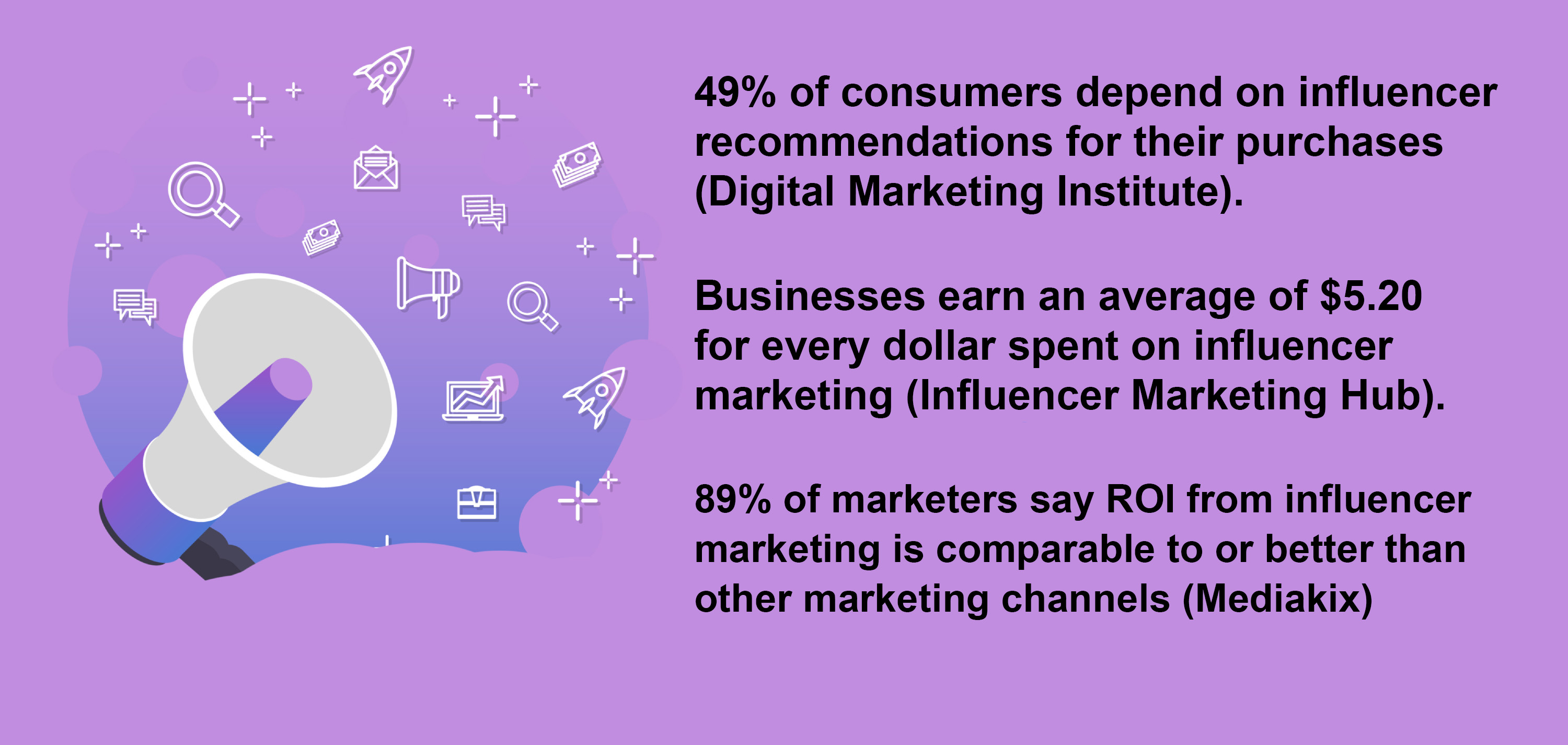
The FTC & The Future of Influencer Marketing:
The FTC actively monitors the influencer marketing landscape and may update its guidelines as the industry evolves. Staying informed about these developments demonstrates your commitment to compliance:
Follow the FTC Website: The FTC website provides a wealth of resources on influencer marketing, including guidance for both brands and influencers. Bookmark the FTC's influencer marketing page and stay updated on any changes.
Industry Resources & Associations: Industry associations and publications often provide insights and resources on FTC compliance for influencer marketing. Utilize these resources to stay ahead of the curve.
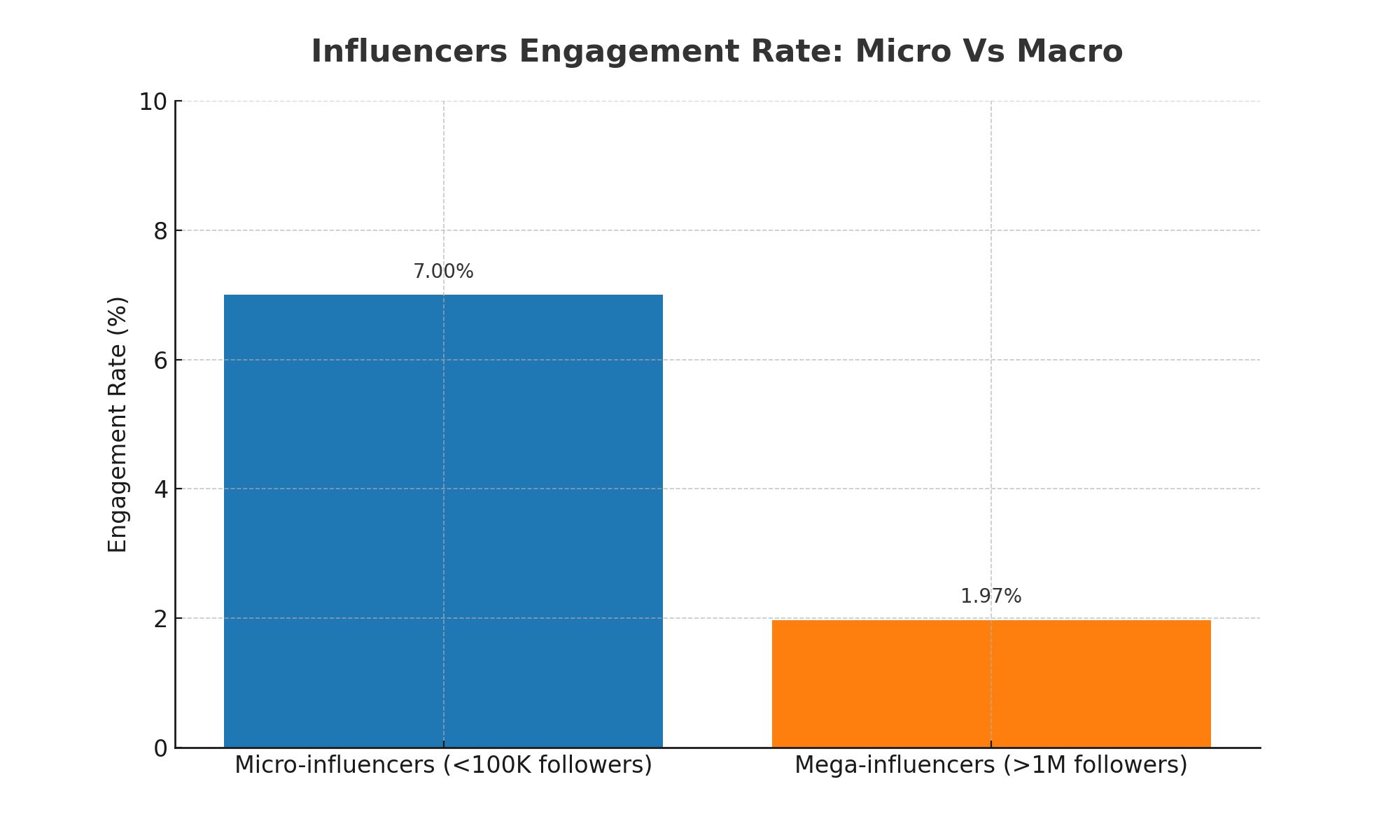
The Takeaway: Transparency Breeds Trust
By prioritizing transparency and building genuine partnerships with influencers, you can navigate the FTC landscape with confidence. Remember, the FTC isn't here to stifle creativity; it aims to protect consumers and ensure a fair playing field. Embrace transparency, prioritize FTC compliance, and watch your influencer marketing campaigns flourish!
Bonus: Tools and Resources for Success
Here are some additional resources to equip you for success in the world of FTC-compliant influencer marketing:
Influencer Marketing Association
Social Media Disclosure Checker Tools: Several online tools can help you create compliant influencer marketing disclosures. Explore these resources to streamline the process.
Bonus resources for those who want a deeper understanding of digital marketing:
- TikTok Marketing: Worth the Hype? Master Short-Form Video
- It's Not About Beating the Algorithm, It's About Understanding It
- The Psychology of Clicks: Crafting Headlines That Hypnotize Your Readers
- Words and Phrases That Build Trust
- What is Parasite SEO?
By leveraging the power of transparency, collaboration, and these valuable resources, you can ensure your influencer marketing efforts are not only engaging but also FTC-compliant, paving the way for long-term success and a flourishing brand presence.
Why Choose Unlimited Exposure Online for Influencer Marketing for Restaurants in Toronto?
Unlimited Exposure Online is your trusted expert in local SEO and influencer marketing for Toronto restaurants. With nearly 30 years of experience, we've crafted over 1,400 stunning and affordable website designs in Toronto. Our mission is to help businesses enhance their online presence through innovative digital marketing strategies.
Tired of searching for a "Toronto digital marketing agency"? Look no further! We prioritize understanding your goals, creating customized social media marketing plans, and delivering measurable results. Our adaptable services are tailored to meet your specific needs. Contact us today and experience the impact we can have on your business!
